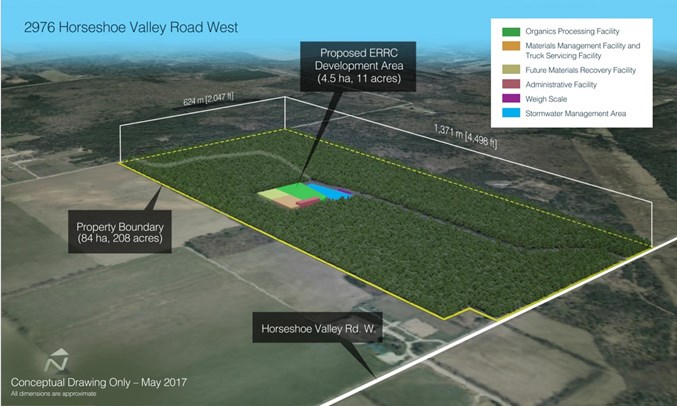Proposed changes to provincial legislation - being billed a growth plan for the Greater Golden Horseshoe - could help push through a compost and recycling plant proposed within the boundaries of a tract of the Simcoe County forest.
For Mary Wagner, the changes are infuriating.
She is president of Friends of the Simcoe Forests Inc, the organization that's fighting the proposed location of the compost and recycling facility.
“This could be anybody, any group that’s trying to change the government’s mind,” said Wagner. “You can say, ‘Your rules say you shouldn’t do this,’ and they can say, ‘We’re going to change that rule.’”
The County of Simcoe applied to the province for permission to build the compost and recycling facility in the middle of the Freele Tract of the Simcoe County Forest.
The Ontario Ministry of Municipal Affairs and Housing (MMAH) approved the county’s request and granted an official plan amendment to allow the facility in the forest, which is north of Barrie in Springwater Township.
The facility – called an Environmental Resource Recovery Centre (ERRC) – will receive the county’s organics and recycling to be broken down into compost, fertilizer, or fuel for use in the county.
The crux of the Friends of the Simcoe Forests argument is a natural heritage designation on the forest where the facility is proposed.
However if Bill 108, otherwise known as A Place to Grow: Growth Plan for the Greater Golden Horseshoe 2019, is passed, the plan will be exempt from the heritage designation rules.
The way Wagner sees it, the province is changing the rules in the middle of the game.
“(The province) said they do intend to waive the national heritage designation (on the land). It will not even apply,” said Wagner. “It is outrageous. We’re still going to go straight ahead, but one of our big arguments (in our appeal) was the fact that (the County of Simcoe) has downplayed the natural heritage significance, wildlife and species significance within this tract.”
Since filing their appeal, Wagner says the group has heard back from the province that they have a valid case. According to the County of Simcoe, a case management conference with all parties will be held on Aug. 7 at the Township of Springwater Administration Centre.
Bill 108 proposes changes to 15 pieces of legislation including some that directly affect local government.
The changes impact planning and financial tools that municipalities and counties use to plan parks, recreation centres, libraries, subsidized housing, paramedic services, community infrastructure, heritage designations (building and land) and community infrastructure.
There are also changes proposed to the way in which members of the public and/or applicants can appeal decisions made (or not made) on development applications - known as the Local Planning Appeal Tribunal.
This appeal process is what Friends of Simcoe Forests, and two others, have engaged to fight the ERRC proposal.
“I think that we’ve done all the things we’re supposed to do by following the rules, and now we’ve just had the rug pulled out from under us. It’s not right,” said Wagner. “It’s unfair.”
When reached on Thursday, Barrie-Springwater-Oro-Medonte MPP Doug Downey said the important thing to remember is that this change is still in its proposal stages.
“We’re still out on consultation on the regulations,” he said. “I checked with the ministry, and they said the consultation closes June 1 and no final decisions have been made yet.”
The bill could reach final reading and be passed as early as next week.
Downey said the goal of the bill - in general - was to bring clarity to rules related to planning and development in Ontario.
“To bring certainty to possibly move forward with plans, depending on what the final decision is,” he said. It depends on what they’re going to do with the regulations.”
According to Debbie Korolnek, general manager of engineering, planning and environment with the County of Simcoe, changes to policy surrounding long-term projects as they advance is more common than you might think.
“It allows for a fair system given that policy can change over the life of a project,” she said. “Proponents who have invested significant resources into a project are provided with some provisions to have applications considered under the ‘policies of the day.’”
Korolnek makes it clear that the changes to the policy do not stop the Local Planning Appeal Tribunal (LPAT) process for the ERRC project, nor does it provide approval or end the appeals process.
“It merely provides clarity on which Growth Plan policies are to be applied when the LPAT considers this case (as some have changed since the project was initiated),” she said. “The process to address the three appeals... is complicated, ongoing, and is anticipated to take some time.”
Currently, county landfills are filling up so fast, it's costing the county, and therefore taxpayers, $1.65 million a year to transfer some of its waste to Hamilton, and the cost is only going up.
“The Environmental Resource Recovery Centre is critical to our operations over the next 20 to 30 years and aligns with provincial and national waste practices,” said Korolnek. “Neither of these facilities are waste disposal sites and the county has been planning this infrastructure for almost 10 years. It’s the right thing to do as we all embrace diversion and greater use of our green bin program.”
Members of the public have until June 1 to comment on the proposed addendum to the A Place to Grow: Growth Plan for the Greater Golden Horseshoe 2019.
To provide your comments, click here.
For more details on the County of Simcoe’s ERRC project plans, click here
